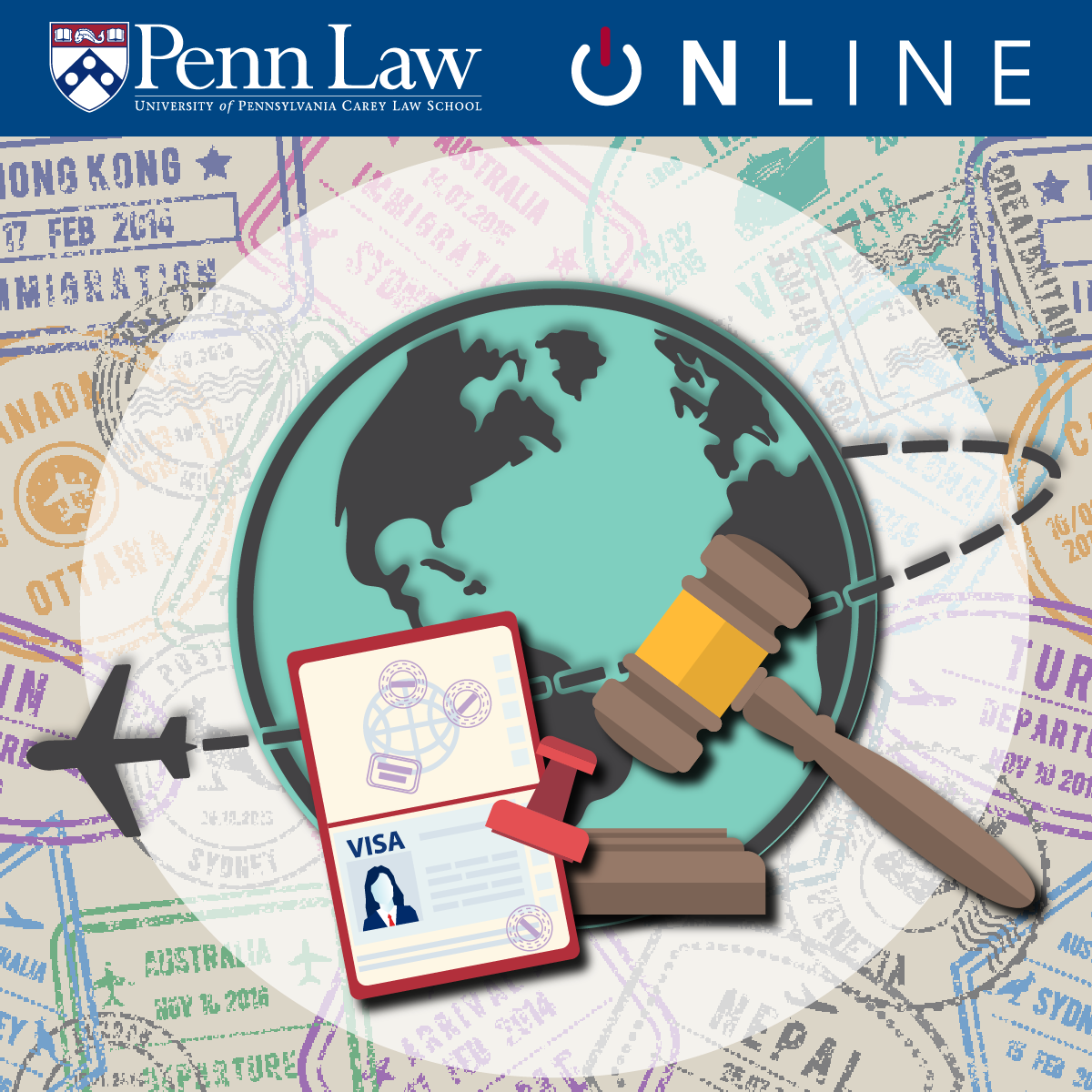Back to Courses









Law Courses
Showing results 1-10 of 73

Copyright Law
Copyright law is unique in the greater intellectual property regime, as it protects original expression that is fixed in a tangible medium and is the product of authorship. This course is designed for creative professionals — such as screenwriters, musicians, documentary filmmakers or artists — who want to understand the scope and limits of which works can enjoy U.S. copyright protection. The course will introduce students to the workings of copyright law through an examination of the system’s basic principles, rules, and institutions. Topics will include; the justifications for copyright law, copyrightable subject matter, authorship, the nature and scope of copyright’s exclusive rights, fair use, and remedies for infringement.
We will also explore real-world examples of legal battles surrounding copyright law, from the recent litigation over Robin Thicke’s hit song “Blurred Lines” to more peculiar cases such as the infamous “monkey selfie” case. By understanding what copyright does and does not protect, producers of creative expression will be able to protect and maximize the commercial value of their works.

Chemerinsky on Constitutional Law - The Structure of Government
This course will highlight the construction and interpretation of the U.S. Constitution through the centuries. You'll learn the history behind the Constitution, cases that formed important precedent, and how changes in interpretation have been dependent on shifts in cultural and political climate as well as the composition of the Supreme Court.
We'll start with an overview of the Constitution where we'll consider questions such as "Why the Constitution?" and "What function does the Constitution serve?" Next we'll examine how the Constitution and its subsequent interpretation established the powers of the federal, legislative, and judicial branches of government and allocated powers to the states.
Join me as we look at the questions both raised and answered by the Constitution and those that interpret it!
By the end of this course, you should be able to:
- Describe how the structure of the United States government has been shaped by both the text of the Constitution and by subsequent interpretation and practice of political actors in all branches of government
- Illustrate compromises found in the Constitution by citing examples and historic background
- Articulate the importance of key cases such as Marbury v. Madison, McCullough v. Maryland, and Lochner v. New York
- Explain how the outcome of cases is often dependent upon the current cultural and political climate as well as the composition of the court by citing particular cases and important shifts in the court's jurisprudence
- Assess the relative suitability of various approaches to constitutional interpretation and analysis

Nuts and Bolts of U.S. Immigration Law
This course begins by exploring short term entry and long term entry into the United States. We will cover the various means of short term entry and long term entry, as well as the general application processes. We will also examine exclusion and deportation in the United States. In particular, we will discuss how and why individuals may not be admitted into the United States and possible reasons for deportation or removal. Lastly, we will cover the process of how to become a United States citizen and the various requirements for naturalization.

Becoming a Sports Agent
An immersive experience in the world of sports that will take students through the four stages of a professional athlete's career. Utilizing lectures, guest speakers, reading assignments and hypothetical walkthroughs, students will learn how the best sports agents manage clients at each of these four stages.
This course will provide each student with the skills necessary to guide an athlete through the difficult decisions that can make or lose the athlete millions of dollars, as well as affect their public image and career. Walking through the four stages of an athlete's career, we will provide a broad scope of the landscape of amateur and professional sports so that you can avoid the pitfalls and traps that so many have fallen into in the past; not to mention, bringing you updates throughout the course regarding the rapidly changing sports world that we live in today. Analyzing the best practices in the management of the superstar athletes with whom Professor Carfagna, Professor Volante and their expert guests have worked, we will show you how to manage the career of any professional athlete who might seek your guidance at any stage of his or her professional career.

Privacy in the USA
After having followed Privacy in the Western world you have become acquainted with the overall global legal system and the origins of privacy as a concept as well as privacy as a (human) right. This course deals with the American legal system to protect privacy.
In the USA privacy is protected through different legal concepts. Constitutional protection through the 4th Amendment plays a crucial role in protecting the US citizen against unjust governmental intrusion. As part of a myriad of consumer protection laws (e.g. health, financial) personal data is also protected. And last but not least there are a number of specific laws dealing with the (privacy) protection of all sorts of communications, such as mobile telephony, e-mail, online searches, etc.
The course deals with the main legal concepts in such a way that the learner will, after having successfully completed the course, be able to follow the legal developments in the USA.
We hope you enjoy the course!

Economic Growth and Distributive Justice Part II - Maximize Social Wellbeing
If you really care about the big questions in the economies and societies of the 21st century, such as distributive justice - namely, inequality of income or wealth, and its correlation with economic growth - this course is meant for you. The knowledge you will gain can truly change your outlook on our world.
"Economic Growth and Distributive Justice - Maximizing Social Wellbeing" is the second part of a two part course and it includes the following five lectures:
(1) The excess burden of taxation
(2) Tax incidence: who bears the economic burden of tax?
(3) Progressivity: definition and ways to achieve
(4) Low Income, Low Ability and the Optimal Income Tax Model
(5) Designing the Tax and Transfer System that Maximizes Social Wellbeing
If you haven't done that already, we strongly recommend that you register for the first part of the course: "Economic Growth and Distributive Justice - the Role of the State". Taking both parts of the course would enable you to obtain a fuller and more comprehensive knowledge about Economic Growth and Distributed Justice.
The course is founded upon the elemental idea that the role of the state is to maximize the well-being - or simply the happiness - of its residents. In 9 fascinating, edifying lessons, using only simple words and decoding professional terminologies that sometimes baffle the intelligent layman, the course expounds many truths – both intuitive and unintuitive. Often using examples from the US and Europe, it does not however focus on policies in any particular region of the world, and is directly applicable to all countries around the globe.
The course touches upon the essence of important concepts like efficiency and equity, inequality and poverty, gross domestic product, tax evasion and tax planning; it presents the work of Nobel Laureate James Mirrlees and his followers - promoting a coherent system that integrates tax and government expenditures to maximize social welfare; and illuminates a range of high-profile issues from their economic angle:
• Climate change: the atmosphere and oceans as public goods, and how smart (Pigovian) taxation can be used to combat the rapidly increasing threats to our planet;
• Technology as the engine of economic growth;
• Taxing the rich: How can we mitigate the growing inequality problem? Should we impose a global tax on capital?
The curriculum includes interviews with major figures in the fields of law and of economics: Harvard's Elhanan Helpman, Dan Shaviro from NYU and Richard Epstein from the University of Chicago and NYU.
After successfully completing this course, you can expect to be able to:
• better understand economic issues presented in the media
• form an informed opinion on the strengths and weaknesses of presented social economic policies
• define and measure inequality and poverty
• define the connection between inequality (income, wealth) and economic growth
• explain the foundations of economic growth
• design a tax and transfer system to maximize the happiness of individuals
All these will allow you to better understand the policies being developed around you, and to play a larger, more informed role in their development, as a conscientious citizen.
In order to receive academic credit for this course you must successfully pass the academic exam on campus. For information on how to register for the academic exam – https://tauonline.tau.ac.il/registration
Additionally, you can apply to certain degrees using the grades you received on the courses. Read more on this here –
https://go.tau.ac.il/b.a/mooc-acceptance
Teachers interested in teaching this course in their class rooms are invited to explore our Academic High school program here – https://tauonline.tau.ac.il/online-highschool
This course is a direct extension of the first part "Economic Growth and Distributive Justice Part I -The Role of the State", so if you have not yet taken it, we highly recommend you start your learning from there (https://www.coursera.org/learn/economic-growth-part-1/home/welcome).
This course will temporarily close for enrollment from March 1st, 2022 to August 31st, 2022. During this time, the course will be closed for new enrolments. All of the course materials will continue to be able available to previously enrolled learners; however, the course staff will not provide support in the Discussion Forums during this period.
Best,
The Tel Aviv University Team

Speaking and Presenting: Pitches and Persuasion
The hope good presenters project when pitching their ideas is not naïve hope. They’re not Pollyanna at the podium. Instead, the solutions they offer are supported by research, data, and expertise. This course will teach you how to merge hard facts with an imaginative vision in a way that at once resonates with and inspires your audience.

European Business Law: Doing Business in Europe
This six-week course titled Doing Business in Europe is the second in a series of three exploring some of the main business aspects of European Union law. Besides providing learners with a sound knowledge base of European laws and regulations relevant to establishing and managing a company within the European Union, the course also explores business considerations within a broader perspective by including inputs from leading law practitioners in the field. More specifically, the course discusses strategic and financial considerations within Company law, as well as Labour law issues such as restructuring enterprises, working conditions and handling crises situations. The course also examines other legal areas such as Tax law, Environmental law and Private International law, and how they tie in to doing business in Europe.
At the end of this course, you will have a basic understanding of how to:
· Understand the relevant regulations governing the internal European Union market
· Establish and run a company within the European Union
· Employ staff and recognize workers’ rights and obligations
· Comply with tax regulations and environmental standards
· Set up agreements and resolve cross-border disputes
· Successfully analyse EU case law and draft case reports
About the Series
The Lund series in European Business Law ranges from considering the basic structures and principles of the European Union to focusing on specialized areas of European Union law. The first course, Understanding the Fundamentals, examines the core structures and principles of the European Union. The third and final course, Competing in Europe, goes into depth concerning how to compete on the internal market and protect your brand, product or invention. All three courses can be taken independently or in sequence depending on your needs and preferences.
To keep up to speed on the course series, visit our Facebook page at:
https://www.facebook.com/eblmooc/
Syllabus and Format
Each course consists of a number of modules where one module represents about one week of work. A module includes a number of lectures and readings, and finishes with an assessment – a quiz or a peer graded assignment. The assessments are intended to encourage learning and ensure that you understand the material of the course. Participating in forum discussions is voluntary.
Course I - Understanding the Fundamentals
Module 1. Introduction
Module 2. Legal Method and Sources
Module 3. Constitutional Freedoms and Fundamental principles
Module 4. Enforcement of EU Law and Judicial Review
Module 4. Freedom of Movement
Module 5. The External Dimension
Course II - Doing Business in Europe
Module 1. Making Business Transactions
Module 2. Establishing a Company
Module 3. Employing and Working in Europe
Module 4. Paying Taxes and Complying with Environmental Standards
Module 5. Resolving Cross-border Disputes
Module 6. Case Clinic
Course III - Competing in Europe
Module 1. Trademarks as essential Assets
Module 2. Defending Patents
Module 3. Competition: Illegal Agreements
Module 4. Competition: Abuse of Dominance and Mergers
Module 5. Selling to the State and State Aid
Module 6. Legal Writing and Argumentation
Lund University
Lund University was founded in 1666 and has for a number of years been ranked among the world’s top 100 universities. The University has 47 700 students and 7 500 staff based in Lund, Sweden. Lund University unites tradition with a modern, dynamic, and highly international profile. With eight different faculties and numerous research centers and specialized institutes, Lund is the strongest research university in Sweden and one of Scandinavia's largest institutions for education and research. The university annually attracts a large number of international students and offers a wide range of courses and programmes taught in English.
The Faculty of Law is one of Lund University’s four original faculties, dating back to 1666. It is a modern faculty with an international profile, welcoming both international and Swedish students. Education, research and interaction with the surrounding community are the main focus of the Faculty’s work. The connection between the three is particularly apparent in the programmes and courses offered by the university, including the university’s MOOC course in European Business Law. The students get the chance to engross themselves in traditional legal studies, while interacting with both researchers and professionally active lawyers with qualifications and experience from various areas of law.
The faculty offers three international Masters: two 2-year Master’s programmes in International Human Rights Law and European Business Law, and a 1-year Master’s in European and International Tax Law. Students from around 40 countries take part in the programmes which offer a unique subject specialization within each field, with highly qualified researchers and professional legal practitioners engaged in the teaching.
The Master’s programme in European Business Law provides an in-depth understanding of both the practical and the theoretical aspects of business law within the European Union. The programme provides both general and specific knowledge of the European Union legal framework, which is necessary for students intending to work as legal advisors or business decision-makers. The programme is delivered in English and is open to students with at least a three year degree in Law (Bachelor, LL.B, or equivalent) who want to specialise in European economic and business law.
The MOOC course in European Business Law is a great course to start with for students intending to apply for the Master’s programme in European Business Law. Even though the MOOC course does not grant credits previous knowledge of the subject is considered upon admission to the master’s programme. For more information about the Master’s programme in European Business Law see https://www.law.lu.se/#!meb

Cloud Computing Law: Transactions
Have you ever wondered what’s in the small print of cloud contracts? Or who owns the information you upload to the cloud? And who can access and control it? If so, then this course is for you! You’ll learn to identify the legal risks involved in cloud computing transactions - and to suggest possible solutions.
To understand how cloud computing works, we’ll first describe different kinds of cloud services and explain how they differ from in-house IT in terms of control, access, and cybersecurity. To understand how the law applies to cloud computing transactions, we’ll focus on the contracts between cloud providers and their customers. You’ll learn to identify and interpret key contract terms and to assess whether customers might negotiate better terms with providers. Finally, we’ll explain how English law protects trade secrets and copyright works stored in the cloud.
If you’re a lawyer, this course will be your guide to cloud infrastructure and supply chains. If you have a technical or commercial background, this course will introduce you to key legal issues in contracts and intellectual property. In short, if you’re interested in how the law applies to cloud computing, this course is for you.

International Law in Action: A Guide to the International Courts and Tribunals in The Hague
International Law in Action explains the functions of each international court and tribunal present in The Hague, and it looks at how these institutions address contemporary problems. On the basis of selected cases, and through interviews with judges and lawyers, you will explore the role of these courts and tribunals and their potential to contribute to global justice.
The first module of the course will investigate how judicial settlement is different from other more political forms of dispute settlement, such as negotiation and mediation. It offers a brief historical overview and introduces the judicial and arbitral bodies based in The Hague. In the remaining modules you will learn about the functions of these courts and tribunals, and some of the challenges and prospects that they face. Three cross-cutting themes tie together all of these modules: (i) The interaction between law and politics; (ii) The continuing role of State consent; and (iii) The ability of international courts and tribunals to protect the public interest and global values.
This course offers you an opportunity to gain a better insight into the functions and features of the courts and tribunals present in The Hague. You will gain a familiarity with each court or tribunal. You will develop realistic expectations of their capacity to address contemporary problems and an awareness of their limitations. You will also be able to discuss some of their most prominent cases.
If you would like to have a better understanding of international law in action in The Hague, this is definitely the course for you!
This course is free to join and to participate in. There is the possibility to get a verified certificate for the course, which is a paid option. If you want a certificate, but are unable to pay for it, you can request financial aid via Coursera
Popular Internships and Jobs by Categories
Find Jobs & Internships
Browse
© 2024 BoostGrad | All rights reserved